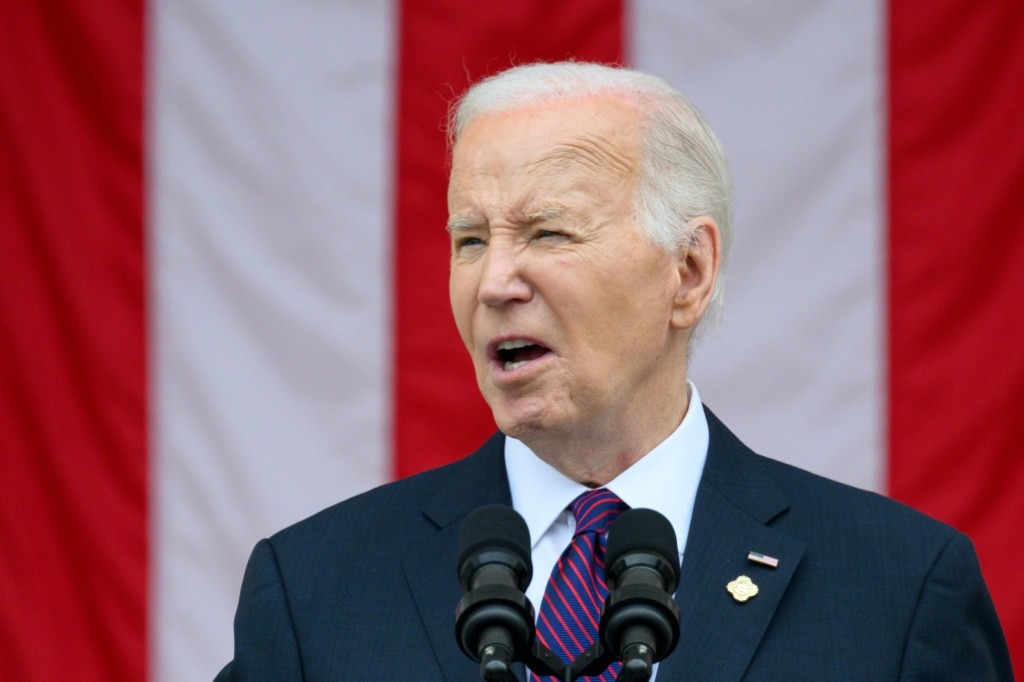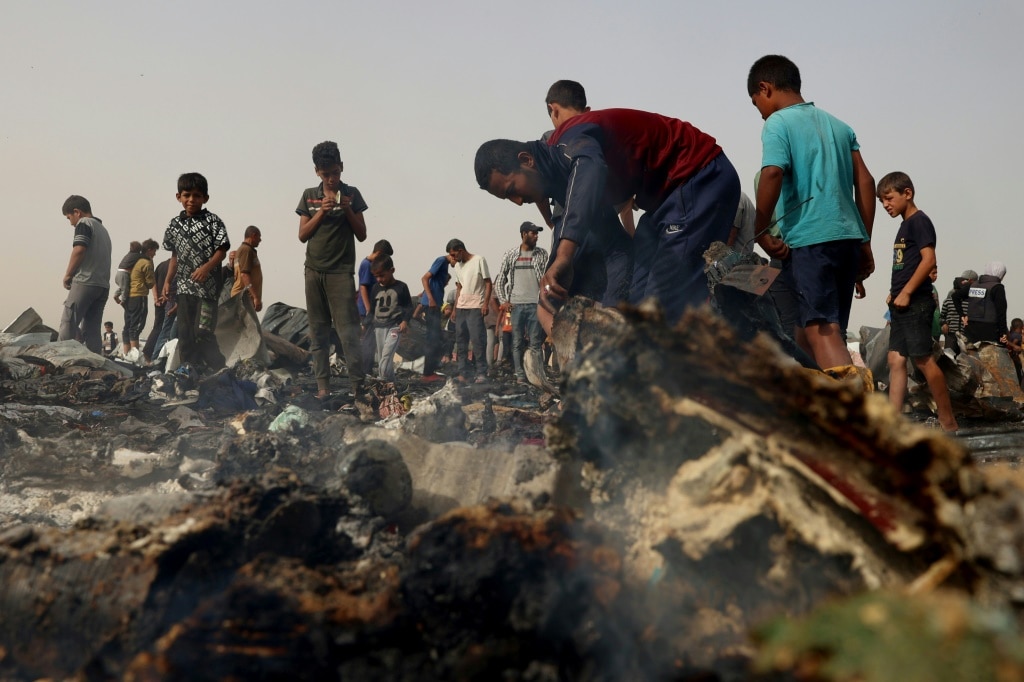How Israel has avoided US ‘red lines’ in Rafah
Taking control of the border, known as the Philadelphi Corridor, will allow Israel to prevent Hamas from rearming by smuggling weapons through tunnels that reach into Egypt.

Israel said it has secured control of Gaza’s southern border with Egypt, achieving a key goal of the Rafah offensive as it seeks to eliminate Hamas without crossing red lines set by President Biden.
Israeli officials say taking control of the roughly 14.4km border, known as the Philadelphi Corridor, will allow Israel to prevent Hamas from rearming by smuggling weapons through tunnels that reach into Egypt. Israel last controlled the corridor in 2005, before relinquishing control of the enclave to the Palestinians.
The latest advance also risks sparking new tensions between Israel and Egypt. An Israeli military official said Israel had so far found 20 cross-border tunnels in the area, some already known to Israel and Egypt and some that were unknown before the operation.
The official said Israel had informed Egypt about cross-border tunnels it had found, and Israel has said it hoped to work with Egypt to prevent future smuggling. A senior Egyptian official said Israel hadn’t communicated to Cairo anything about the tunnels and said Israel was “using these allegations to justify continuing the Rafah operation.”
🔴UNCOVERED: 1.5km long terrorist tunnel route in eastern Rafah containing dozens of anti-tank missiles and weapons was dismantled.
— Israel Defense Forces (@IDF) May 29, 2024
Only 100 meters from the Rafah Crossing, our soldiers located a tunnel shaft branching into several different routes that contained several blast… pic.twitter.com/OtOHCy2a78
Israeli forces in Rafah have largely been focused on taking control of the border area, an area that isn’t densely populated like other parts of Rafah. The Biden administration has for months been warning about the dangers that operating in the populated core of the city could pose for civilians.
“I can’t confirm whether they seized the corridor or not, but I can tell you that their movements along the corridor did not come as a surprise to us and was in keeping with what we understood their plan to be, to go after Hamas in a targeted, limited way, not in a concentrated way,” said John Kirby, a spokesman for the National Security Council.
“When they briefed us on their plans for Rafah, it did include moving along that corridor and out of the city proper to put pressure on Hamas in the city,” he said.

Israel has avoided crossing Washington’s red lines in Rafah by gradually deploying limited numbers of troops, forcing a rapid evacuation of the Gaza city and refraining from a full-scale ground assault, Israeli officials and analysts said.
The tactics have inoculated Israel from deeper criticism from the Biden administration so far, as it faces crescendoing international condemnation, especially after an Israeli air strike resulted in dozens of civilian deaths in a Rafah tent encampment on Sunday.
Even that strike drew a muted response from U.S. officials. Israel said it killed two important Hamas leaders and used smaller munitions with precision-guidance systems, following the advice of American officials. Israeli military officials said the air force fired on an area near a civilian population but that the munitions used couldn’t have caused the fire that tore through the encampment.
American diplomatic support and weapons supply depend on Israel’s ability to manage a balance between accomplishing its military objectives in Rafah and appeasing the Biden administration. On March 9, Biden called a Rafah offensive a red line, citing the more than a million civilians who were sheltering there and the city’s role as a hub for humanitarian operations. But he also said he wouldn’t abandon Israel and would maintain its Iron Dome missile-defence system.
Some Democrats have criticised Israel’s conduct in Rafah, and pro-Palestinian protests on U.S. college campuses have piled pressure on the White House to restrain Israel. Such tensions may persist for some time. Fighting in Gaza is likely to continue through this year, Tzachi Hanegbi, the head of Israel’s National Security Council, said Wednesday in an interview with Israel’s public broadcaster Kan.
Kirby said Tuesday that the White House still opposed a major ground operation in Rafah, and he set out what that would look like.
“Lots of units, tens of thousands of troops, or thousands of troops moving in a co-ordinated set of manoeuvres against a wide variety of targets on the ground in a massive way,” Kirby said. “That’s a major ground operation … and we have not seen them move in that way.” In delineating the parameters in such a way, the Biden administration risks being accused of making its red lines more elastic.
Hamas on Wednesday said the U.S. was demonstrating double standards. Behind the scenes, the administration worked hard to influence how Israel went into Rafah, an operation the Israelis said was non-negotiable because they believe that Hamas’s last military units must be destroyed there and that tunnels from Egypt’s Sinai Peninsula to the city represent the militant group’s most crucial supply lines. While Biden’s relationship with Israeli Prime Minister Benjamin Netanyahu has frayed, the ties between Defense Secretary Lloyd Austin and Israeli Defense Minister Yoav Gallant remain strong.
The Biden team successfully forced Netanyahu to design a different approach toward Rafah, said William Wechsler, senior director of the Rafiq Hariri Center and Middle East Programs at the Atlantic Council in Washington.
The idea that the Biden administration was moving its red lines was inaccurate, he said, and based on a “widespread misunderstanding what the original goal posts were.” Washington’s concern that it would take months for the over one million Palestinians sheltering in Rafah to evacuate hasn’t come to pass, say Israeli officials and security analysts. Around a million Palestinians of a total of 1.4 million sheltering in the city and its environs have left since the operation began in May, according to the United Nations.

Humanitarian groups have decried the rapid displacement of Palestinians from Rafah, which represented one of the many times Gazans have had to pack up their belongings and flee, this time to tent cities along the coast. But the result has been a Rafah that has far fewer civilians.
Philippe Lazzarini, commissioner-general for the United Nations agency for Palestinian refugees, warned earlier this month that the areas people are fleeing to don’t have safe water supplies or sanitation facilities.
Al-Mawasi, the area designated by Israel as a humanitarian zone, “lacks the minimal conditions to provide emergency humanitarian assistance in a safe and dignified manner,” he said. “The place is crammed and cannot absorb more people.” A senior Biden administration official said last week that the White House had gained confidence that an expanded operation in Rafah could go ahead after Israeli officials briefed national security adviser Jake Sullivan on their revised plans to address potential harm to civilians and evacuations from the area.
“The red lines changed once they saw this could be done in a way that met their conditions. The administration misassessed what was happening, ” said Chuck Freilich, a former deputy national security adviser in Israel.
Israeli officials insist their operations in Rafah aren’t tailored to suit Washington’s needs, but are carried out according to their own operational and ethical guidelines.
After Biden and other U.S. officials warned against a full-scale assault on Rafah in March and April, Israel sent troops into Rafah only gradually, beginning in the first week of May, and without an announcement. Israel eventually called it a limited operation.
The sightings by witnesses of Israeli tanks closer to Rafah’s centre on Tuesday weren’t indicative of a wider push into the city, said Michael Horowitz, the Israel-based head of intelligence for the consulting firm Le Beck.
But as Israel continues to pour troops along the corridor, Horowitz said, it will be under greater pressure to expand operations northward into more populated areas of Rafah to protect troops, who are constantly under fire from Hamas.
Three Israeli soldiers were killed in Rafah, Israel’s military said Wednesday, as it pressed on with its pursuit of Hamas.
Horowitz said it appeared the Israeli military was giving its government some leeway to continue talks with Hamas to free hostages in Gaza before penetrating further into the city.
Those faltering talks could restart as early as this week, though Israel and the mediators are waiting to hear whether Hamas is prepared to go back to the negotiating table.
“If there’s no deal, there will be a lot of pressure on the [Israeli military] to expand the operation,” Horowitz said.
Israel would need to operate across all of Rafah, even sometimes in densely populated areas, to find Hamas’s rocket caches, weapons manufacturing sites and kill or capture the militant group’s leaders and military officers, who could provide valuable intelligence including the whereabouts of hostages, said Jacob Nagel, a senior fellow at the Foundation for Defense of Democracies.
“There will be places when you’ll have to fulfil your mission and finish as fast as and as carefully as you can,” said Nagel, a former Israeli national security adviser. “Sometimes you will go into a densely populated area and do the least amount of damage you can do.” It has become part of Israel’s strategy during the war to lay out its broader plans in public but keep Hamas and observers guessing about when and how they will be enacted.
After the Oct. 7 Hamas-led attacks on southern Israel in which 1,200 people were killed, mostly civilians, according to Israel, and more than 240 taken hostage, Netanyahu promised that Israeli troops would “be everywhere” in Gaza “with all our might.” The ground invasion that followed weeks later started at night and without a word from officials that it had begun.
Since then, 36,000 Palestinians have been killed in Gaza, most of them civilians, Palestinian officials have said, without specifying how many were combatants.
Dow Jones







To join the conversation, please log in. Don't have an account? Register
Join the conversation, you are commenting as Logout